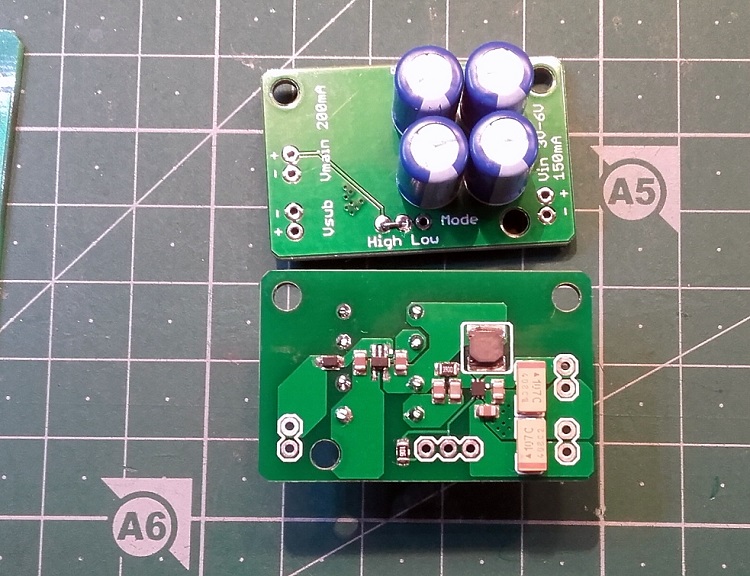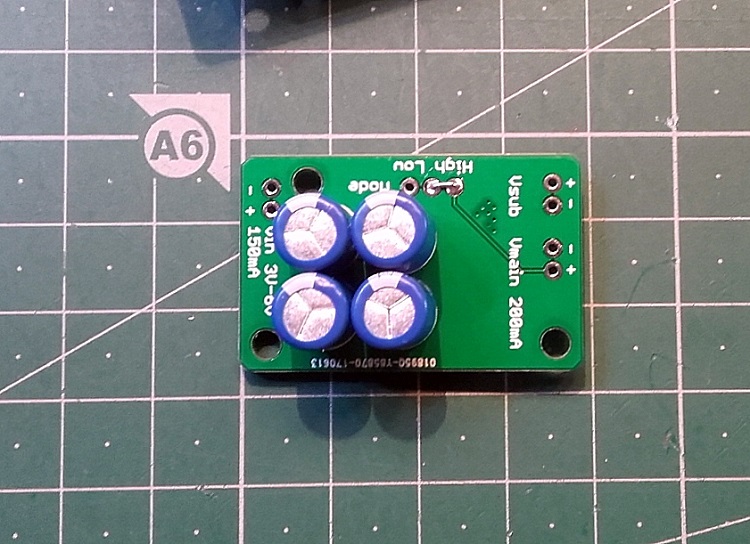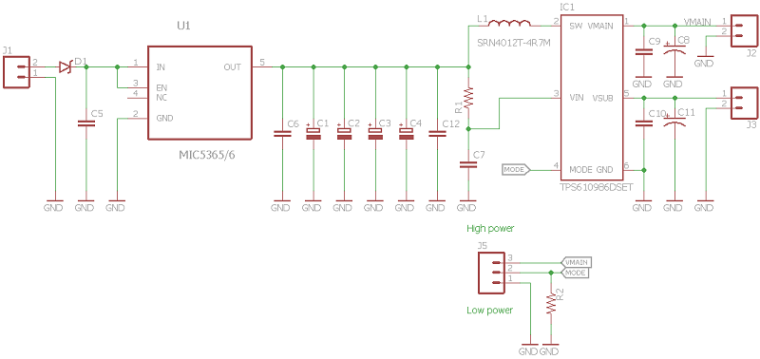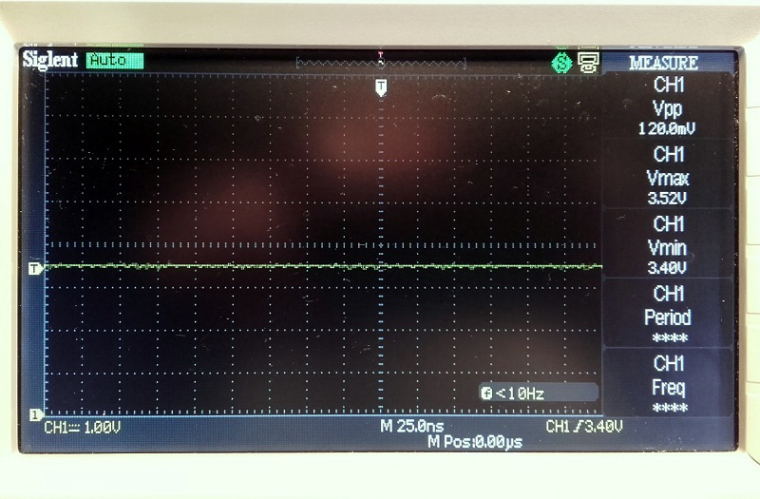How best to find the "best" small solar panel of a particular size?
-
I already have one boost buck converter, I only need the supercap charge controller for 2 supercap or use the 5.5v 4F I have
-
@NeverDie said in How best to find the "best" small solar panel of a particular size?:
@alexsh1
Is it any better than:
https://www.openhardware.io/view/276/33v-Buck-Boost-DC-DC-Converter
?Interesting buck-boost converter, but Input voltage is from 1.8v to 5.5v.
I'm looking at the one with a better range of 0.9-5.5V
I need to use two 2.7V super caps in series with a maximum efficiency@alexsh1 said in How best to find the "best" small solar panel of a particular size?:
Interesting buck-boost converter, but Input voltage is from 1.8v to 5.5v.
I'm looking at the one with a better range of 0.9-5.5V
I need to use two 2.7V super caps in series with a maximum efficiencyAccording to its datasheet (http://www.ti.com/product/TPS63030), the TPS63030 has exactly the same Input Voltage Range: 1.8 V to 5.5 V
-
There is a Maxim integrated buck-boost converter, that goes down to 0.7V
http://www.mouser.com/ds/2/256/MAX1584-MAX1585-43040.pdf
It's quite complex though -
@alexsh1 said in How best to find the "best" small solar panel of a particular size?:
Interesting buck-boost converter, but Input voltage is from 1.8v to 5.5v.
I'm looking at the one with a better range of 0.9-5.5V
I need to use two 2.7V super caps in series with a maximum efficiencyAccording to its datasheet (http://www.ti.com/product/TPS63030), the TPS63030 has exactly the same Input Voltage Range: 1.8 V to 5.5 V
-
There is a Maxim integrated buck-boost converter, that goes down to 0.7V
http://www.mouser.com/ds/2/256/MAX1584-MAX1585-43040.pdf
It's quite complex though -
@NeverDie you are correct - TPS63030 has got 1.8-5.5V input voltage.
I wonder if there is a buck-boost converter with lower than 1V lower voltage?
@alexsh1 said in How best to find the "best" small solar panel of a particular size?:
@NeverDie you are correct - TPS63030 has got 1.8-5.5V input voltage.
I wonder if there is a buck-boost converter with lower than 1V lower voltage?
You'd probably get the biggest range by combining a separate boost converter with a separate buck converter, rather than using a single integrated buck-boost unit.
-
Well, so far the green supercap isn't holding its charge any better. I'll leave it in-circuit for two or three days, though, and see if that improves. It's encouraging that the rate of voltage decrease is decreasing. Some supercaps apparently improve their ability to retain charge if they are forced to hold a charge long enough, though I have no idea why that is. For instance, some capacitor leakage test protocols call for holding a capacitor at its rated voltage for 72 hours before running the leakage test.
@NeverDie said in How best to find the "best" small solar panel of a particular size?:
Well, so far the green supercap isn't holding its charge any better. I'll leave it in-circuit for two or three days, though, and see if that improves. It's encouraging that the rate of voltage decrease is decreasing. Some supercaps apparently improve their ability to retain charge if they are forced to hold a charge long enough, though I have no idea why that is. For instance, some capacitor leakage test protocols call for holding a capacitor at its rated voltage for 72 hours before running the leakage test.
Well, try as I might, I just can't recommend these Chinese supercaps. I've held them at rated voltage for days on end, and I've power cycled them too. For whatever reason, they just don't perform as well as the branded supercaps that I've ordered from Digikey. I'll use-up the few I have on some throw-away prototype experiments, and I won't be ordering any more of them. Presently I think the 10F supercap on Digikey for $2 from Illinois Capacitor continues to be the best of the "value" capacitors. For best performance, I've been pleased with the AVX brand of supercaps.
However, if someone finds something better, either by value or by performance, please do post and let me know.
-
@NeverDie said in How best to find the "best" small solar panel of a particular size?:
Well, so far the green supercap isn't holding its charge any better. I'll leave it in-circuit for two or three days, though, and see if that improves. It's encouraging that the rate of voltage decrease is decreasing. Some supercaps apparently improve their ability to retain charge if they are forced to hold a charge long enough, though I have no idea why that is. For instance, some capacitor leakage test protocols call for holding a capacitor at its rated voltage for 72 hours before running the leakage test.
Well, try as I might, I just can't recommend these Chinese supercaps. I've held them at rated voltage for days on end, and I've power cycled them too. For whatever reason, they just don't perform as well as the branded supercaps that I've ordered from Digikey. I'll use-up the few I have on some throw-away prototype experiments, and I won't be ordering any more of them. Presently I think the 10F supercap on Digikey for $2 from Illinois Capacitor continues to be the best of the "value" capacitors. For best performance, I've been pleased with the AVX brand of supercaps.
However, if someone finds something better, either by value or by performance, please do post and let me know.
-
A few boards arrived and a couple are assembled

The board charges four 1.5F 2.7V super capacitors. It also provides a boost circuit with 3.45V output on main and sub outputs. It works down to 180mV and provides 3.5mA for 30 minutes. I'll report on leakage.

There are two outputs main and sub. Main is on all the time and sub is switched with high signal on the mode connector.

-
A few boards arrived and a couple are assembled

The board charges four 1.5F 2.7V super capacitors. It also provides a boost circuit with 3.45V output on main and sub outputs. It works down to 180mV and provides 3.5mA for 30 minutes. I'll report on leakage.

There are two outputs main and sub. Main is on all the time and sub is switched with high signal on the mode connector.

-
@gohan if not you could add.... wait for it.... a capacitor. (Weak, I know, but I couldnt resist)
-
Noise isn't bad at all. Surprisingly. It is no bigger than the background noise when no input is connected.

-
Noise isn't bad at all. Surprisingly. It is no bigger than the background noise when no input is connected.

-
@ceech very impressive! I really like:
It works down to 180mVthe boost to 3.45V works until the board voltage (between pin 5 and GND) goes down to 180mV?
-
@alexsh1 Yes, the boost converter works down to 180mV. In other words, it can almost completely discharge capacitors.
@ceech Which brand of caps you are using?
I may be interested in this board too.I am currently running your other board with two 10F caps in a test mode with a sensor. Do not have much time for it now, most likely will report in September about my findings.
-
@ceech Which brand of caps you are using?
I may be interested in this board too.I am currently running your other board with two 10F caps in a test mode with a sensor. Do not have much time for it now, most likely will report in September about my findings.
